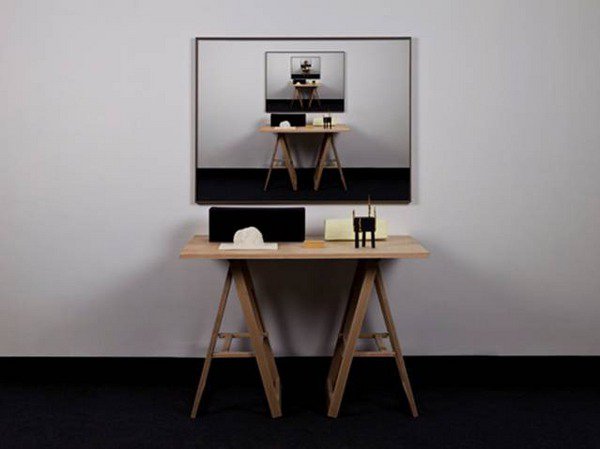Miguel Angel Gaueca
dal 25/5/2012 al 19/7/2012
Segnalato da
25/5/2012
Miguel Angel Gaueca
Galeria Espacio Minimo - Anexo, Madrid
Take a Theme and Develop It. Departing from a specific form, a quadrangular prism, the artist analyses the current mechanisms of formalization, their form inside the artistic educational system and its political implications within the artistic network.

'Take a Theme and Develop' It is the new project of Miguel Angel Gaueca for Espacio Mínimo gallery. Departing from a specific form, a quadrangular prism, the artist analyses the current mechanisms of formalization, their form inside the artistic educational system and its political implications within the artistic network.
Gauecas work has focused in the mechanisms through which power gets interiorized and in the processes of social naturalization. Employing clichés, the construction of sexual identity or art world roles as starting points, he has developed a discourse around how these themes operate in the current social context. For this particular work, the artist proposes a reflection around how form and shape giving –both traditional tasks of an artist- has been constructed according to market interest, generating aprioristic identifications that automatically match a particular form with a political position. A political aestheticization of an uncritical form prevails
In order to do so, he has departed from the study of educational methodologies questioning the formal repetition that they praise in its formative plans. The artist proposes to “develop a theme” and to connect it with different artistic “traditions”. This system of production allows the generation of artistic “market niches” regardless of the artistic development of its producer. At the same time, it neutralizes the assumptions of different artistic movements to convert them in mere ways of doing. It could be affirmed that the mannerism of the works exhibited, with which the artist faces different artistic periods of the XX century, it is not far away from the mechanisms of style that prevail in the current artistic world, in which the form it is not supposed to be adapted to content but, instead, to approach market, gallery and institutional hegemonic trends.
The investigation carried out by GAÜECA it is based on the artistic movements of the last century. During that period, the conflict between form and content radicalized. Since the conception of art autonomy in the XIX century, different theories and formal experiences such as Constructivism emerged. This analysis of the relations between form and function intensifies with the Modern Movement that banned the decorative to generate new ornamental models. The process ended with the supposed emptiness of form in Conceptual Art, and of content in Minimalism.
The form that articulates the project wasn’t chosen by chance. The supposed neutrality of this form has made possible to find it in many artistic proposals, even in critical essays like the one set out by Didi-Huberman in Le Cube et le visage. Autour d’une sculpture d’Alberto Giacometti. A new context and the repetition of these cubes and rectangles allows a rupture of the topics constructed around these forms, making clear that the political or social charge of the form lies within the enunciation mechanism of the one that enunciates, as well as in the collectivity that allows to legitimize that discourse.
Take a Theme and Develop It is presented for the first time as an exhibition gathering more than a dozen works –photography, sculpture, video and installation- produced between 2009 and 2012.
Biography:
Miguel Angel Gaueca lives and works in Bilbao. His work has been exhibited in MARCO, Museo de Arte Contemporáneo de Vigo; Guggenheim Bilbao Museoa, Bilbao, ARTIUM; Centro-Museo Vasco de Arte Contemporáneo, Vitoria-Gastéiz; DA2, Salamanca; Fundación March, Palma de Mallorca; Centro de Arte Santa Mónica, Barcelona or La Casa Encendida, Madrid, en España y en Mücsarnok Kunsthalle, Budapest (Hungary); Australian Centre of Photography, Sidney (Australia); Instituto Cervantes de Tokio (Japón), Sao Paulo and Rio de Janeiro (Brasil)); Berlin Academy of Fine Arts (Germany); IMA, Brisbane (Australia) or the Centre Creation Contemporaine, Tours (France). His work is present in important collections such as
Museo Nacional Centro de Arte Reina Sofía (Madrid) or ARTIUM (Vitoria-Gasteiz).
Opening Sat May 26 12pm
Galeria Espacio Minimo
Doctor Fourquet, 18, Madrid
Tues-Fri 10-14 and 15:30-19:30, Sat 10-18
Admission free



